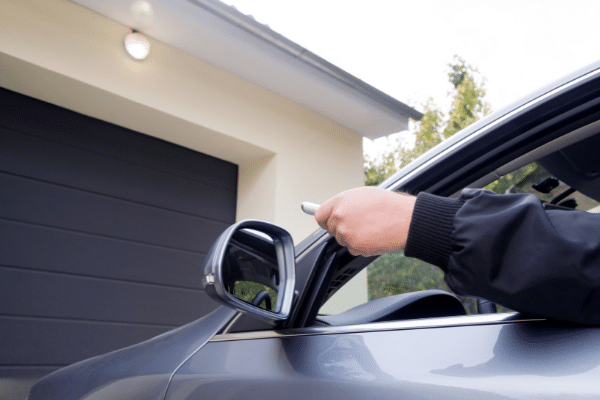In the era of smart homes and interconnected devices, the convenience of remotely operating garage doors has become a standard feature for many homeowners. However, this technological advancement prompts a critical question: “Can Someone Else Remote Open My Garage Door?” This article delves into the intricacies of garage door security, exploring potential risks and offering insights into safeguarding your home against unauthorized access.

Introduction
The integration of smart technology into our homes has undeniably enhanced convenience and efficiency. Remote-controlled garage doors, a hallmark of modern living, allow homeowners to effortlessly open and close their garage doors with the click of a button. Yet, with this convenience comes concerns about security—specifically, the possibility of someone else gaining unauthorized access to your garage. In this article, we unravel the complexities surrounding the question, “Can Someone Else Remote Open My Garage Door?”
Understanding Garage Door Remote Systems
Before addressing the security implications, it’s crucial to comprehend the fundamental workings of garage door remote systems. Most modern garage doors operate using radio frequency (RF) technology, where a remote control sends a signal to a receiver in the garage door opener unit. This signal prompts the motor to either open or close the garage door.
Assessing Security Risks: Can Someone Else Remote Open My Garage Door?
In this section, we delve into the potential vulnerabilities and risks associated with garage door remote systems.
- Code Grabbing and Replication: One of the primary concerns revolves around the interception of the RF signal. If someone with malicious intent manages to intercept and replicate the code transmitted by your garage door remote, they could gain unauthorized access to your garage. This process, known as code grabbing, poses a tangible security risk.
- Weak Encryption: Some older garage door systems might employ weaker encryption methods or lack encryption altogether. Hackers can exploit these vulnerabilities, intercepting and decoding the signals more easily. Upgrading to a system with robust encryption can mitigate this risk.
- Lost or Stolen Remotes: Physical possession of a lost or stolen garage door remote is an immediate security threat. If someone finds or steals your remote, they could potentially use it to access your garage. It’s advisable to promptly deactivate lost remotes and consider implementing rolling code technology.
Safeguarding Your Garage Door: Best Practices
Now that we’ve identified potential security risks, let’s explore proactive measures to secure your garage door and prevent unauthorized access.
- Rolling Code Technology: Upgrading to a garage door opener with rolling code technology enhances security. Unlike fixed codes that remain constant, rolling codes generate a new, unique code for each use. This significantly reduces the risk of code grabbing and unauthorized access.
- Encryption Standards: Opt for garage door openers that adhere to robust encryption standards. Industry-standard encryption protocols, such as AES (Advanced Encryption Standard), provide an additional layer of protection against potential hacking attempts.
- Remote Control Management: Regularly review and manage the remote controls associated with your garage door opener. Deactivate lost or stolen remotes promptly and ensure that only authorized individuals have access to the remotes. Consider implementing a secure method for remote control distribution.
- Smartphone Apps and Security: If your garage door opener integrates with a smartphone app, ensure that the app and associated accounts are adequately secured. Implement strong passwords, enable two-factor authentication, and regularly update the app to benefit from security enhancements.
- Regular Maintenance: Conduct regular maintenance checks on your garage door opener and remote control systems. Ensure that all components are in good working order, and promptly address any issues that may arise. A well-maintained system is less prone to security vulnerabilities.
The Role of Smart Home Security
As smart home ecosystems become more prevalent, integrating your garage door into a comprehensive home security system adds an extra layer of protection. Consider the following measures to enhance overall home security:
- Integrated Security Systems: Connect your garage door opener to a broader home security system. This integration allows for centralized monitoring and control, enhancing overall security and providing real-time alerts in the event of suspicious activity.
- Video Surveillance: Install security cameras in and around your garage area. Video surveillance not only acts as a deterrent but also provides visual evidence in the event of a security breach. Many modern systems allow remote viewing through smartphone apps, offering peace of mind wherever you are.
- Smart Access Control: Implement smart access control measures for your garage, such as biometric authentication or smart locks. These technologies add an extra layer of identity verification, reducing the risk of unauthorized access.
Conclusion
In conclusion, while the convenience of remotely opening your garage door is a testament to the advancements in smart home technology, it’s crucial to address the question, “Can Someone Else Remote Open My Garage Door?” with a proactive mindset. By understanding the potential security risks and implementing robust protective measures, homeowners can enjoy the benefits of smart garage door systems without compromising their security. Safeguarding your home starts with informed choices and a commitment to staying ahead of potential vulnerabilities.



Leave a Reply